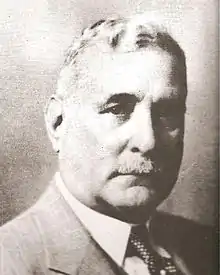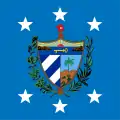Carlos Mendieta
Carlos Mendieta y Montefur (4 November 1873 – 27 September 1960) was a Cuban politician and interim President of Cuba.
Carlos Mendieta | |
|---|---|
 | |
| President of Cuba Interim | |
| In office 18 January 1934 – 11 December 1935 | |
| Vice President | None |
| Preceded by | Manuel Márquez Sterling (Interim) |
| Succeeded by | José Barnet (Interim) |
| Personal details | |
| Born | Carlos Mendieta y Montefur 4 November 1873 San Antonio de las Vueltas, Las Villas, Spanish Cuba |
| Died | 27 September 1960 (aged 86) Havana, Cuba |
| Nationality | |
| Political party | National Union |
| Spouse(s) | Carmela Ledon |
| Children | Carmen Mendieta-Ledon |
A chief opponent of Gerardo Machado, Mendieta was installed as interim President of Cuba in 1934 by a coup led by Fulgencio Batista.[1] During his presidency, women gained the right to vote and the Platt Amendment was rescinded. Mendieta resigned in 1935 after unrest continued.[2]
He was married to Carmela Ledon (? - 20 July 1942) and they had one child, Carmen Mendieta-Ledon, who married Calixto Garcia Velez.
President Mendieta took office on January 18, 1934. His government contained cabinet positions from leading political sectors, including the ABC, the Union Nacionalista, the Menocalista, and the Marianista. Mendieta’s government promulgated a Provisional Constitution on February 3, 1934. The Provisional Constitution envisioned the calling of elections for a constitutional convention before December 31, 1934 and the implementation of said constitution by June, 1935, following which elections would be held and a regular government installed.
On taking office President Mendieta was confronted with a series of strikes, not only in Havana but in the sugar plantations, which threatened to prevent the 1934 sugar crop from being ground. Believing the economy to be in jeopardy the government enacted Decree-Law No. 3 which prohibited the right to strike until after a compulsory waiting period, and authorized the dissolution of labor unions which violated the law. Making use of this decree, the Cuban army arrested a number of labor leaders and provided protection to encourage sugar centrales to grind.
On January 28, 1934 President Mendieta issued a statement stating
"The policy of my administration embraces the restoration of civil authority and personal rights and liberty; financial and economic rehabilitation; the opening of trade channels and the strengthening of relations with our great northern neighbor and best customer; social reforms which will raise the standard of living of the masses, and the stimulation of development of the natural resources of the island. The future of Cuba lies in her going hand in hand with the United States. For obvious reasons and in accord with the expressed desire of both the United States and Cuba, we expect that the Platt Amendment will be substituted by a treaty of friendship and alliance which unquestionably will promote more harmonious relations in the future between the two nations (New York Times)."
In April, 1934, Mendieta’s government authorized the issue of $10 million in silver and declared a moratorium on the amortization payments due on the foreign debt, to continue until annual revenues increased to $60 million. The government increased salaries, fixing the minimum wage of $30 a month for government employees. In May it signed an agreement with the American government abrogating the Platt Amendment, while in August it concluded a new trade agreement with the U.S.[3]
References
- Staff report (29 September 1960). Carlos Mendieta, Ex-Head of Cuba; President, 1934-35, Dies. Reformist Served After Overthrow of Machado. The New York Times
- Phillips, J.D. (11 December 1935). Mendieta Resigns Cuban Presidency; Steps Out After His Failure to Conciliate Political Parties Preparatory to Elections. State Secretary Named Barnet Provisional Executive -- Ministry and Council of State to Meet Today. The New York Times
- "Problems of the New Cuba".
- Otero, Juan Joaquin (1954). Libro De Cuba, Una Enciclopedia Ilustrada Que Abarca Las Artes, Las Letras, Las Ciencias, La Economia, La Politica, La Historia, La Docencia, Y ElProgreso General De La Nacion Cubana - Edicion Conmemorative del Cincuentenario de la Republica de Cuba, 1902-1952. (Spanish)
| Political offices | ||
|---|---|---|
| Preceded by Manuel Márquez Sterling |
President of Cuba Interim 18 January 1934 – 11 December 1935 |
Succeeded by José Barnet |
